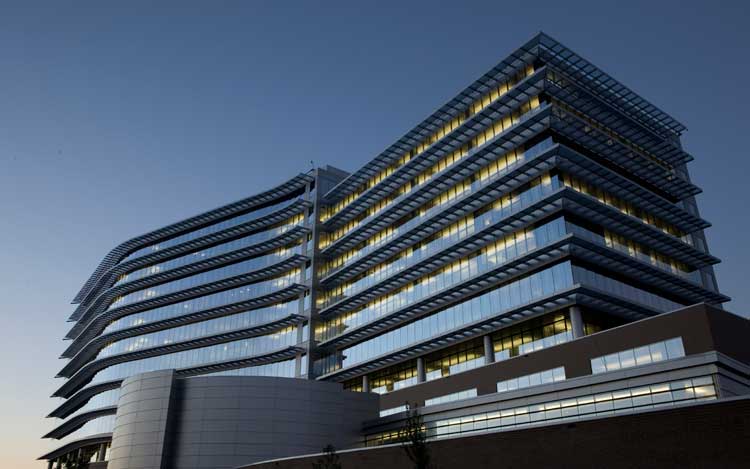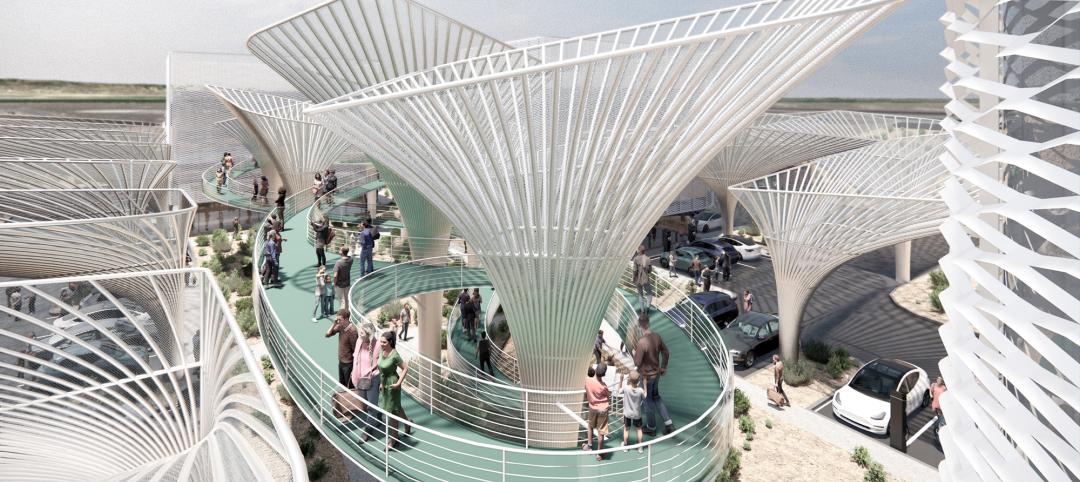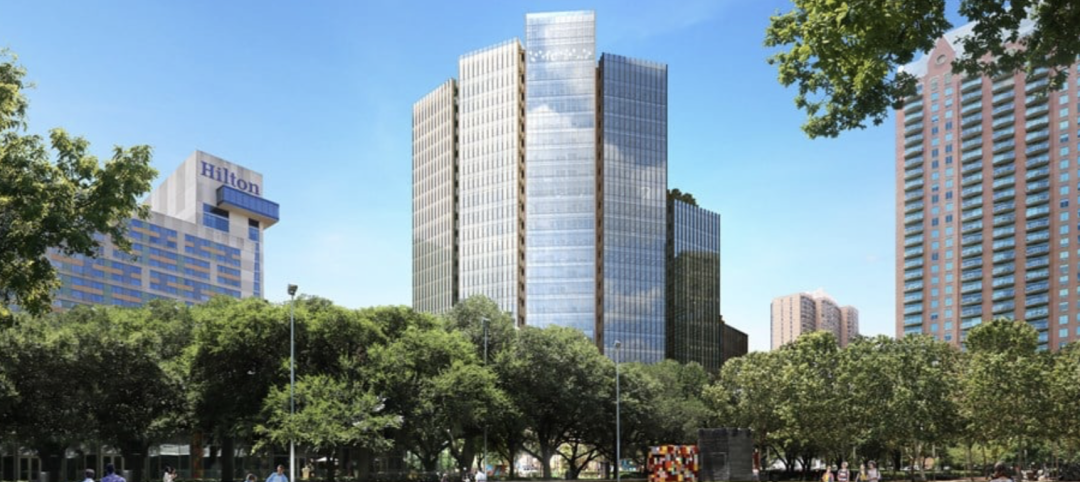CBRE Group announced today five recipient institutions in its Real Green Research Challenge (RGRC). Launched in September 2012, the RGRC is CBRE’s $1 million commitment to fund leading-edge sustainability research and innovation in commercial real estate.
CBRE has awarded RGRC funding and organizational support to sustainability projects developed by the Natural Resources Defense Council, Stanford University, EURO Institute of Real Estate Management, Cleveland State University and Central Michigan University, and Maastricht University.
“Growing market awareness of commercial buildings’ environmental impact is inspiring innovation in sustainability research,” said Bob Sulentic, CBRE’s President and CEO. “The Real Green Research Challenge advances this research by providing financial resources as well as access to CBRE’s market-leading global market data and technical expertise to help address some of the most challenging sustainability issues facing commercial real estate owners, investors and occupiers.”
After an evaluation of more than 100 submissions by an independent judging panel, CBRE has chosen five projects to receive RGRC financial awards:
- a rating system for comparative tenant energy use that provides a quantitative foundation for identifying and promoting energy efficient practices (Natural Resources Defense Council’s Center for Market Innovation);
- a detailed empirical evaluation of EPA ENERGY STAR® energy management strategies allowing facilities and property managers to prioritize energy efficiency projects (Stanford University, Center for Integrated Facility Engineering);
- a comprehensive economic analysis of the value implications of green building practices on large institutional real estate portfolios (EURO Institute of Real Estate Management);
- a new industry-wide, regionally sensitive, green building scoring protocol system to inform U.S. office tenants’ leasing decisions and developers’ sustainable building choices (Cleveland State University and Central Michigan University); and
- a quarterly green building index of the top 30 U.S. metro markets, yielding insights for policy makers, developers and other stakeholders and supporting lenders’ risk management analysis and investors' decisions (Maastricht University).
“The projects supported through the Real Green Research Challenge will add significant knowledge to some of the key sustainability issues in commercial real estate, such as the relative value of sustainable buildings, the most effective energy efficiency initiatives and the location of green building market growth,” said Dave Pogue, CBRE’s Global Director of Corporate Responsibility. “These and other issues are the focus of the projects CBRE is funding, and the answers could have a profound effect on how buildings are leased, occupied and improved in the future.“
CBRE’s Environmental Sustainability program includes global commitments in 11 key areas of environmentally sound performance, including resource management, occupancy, communications and training, public policy and procurement. The program provides best practices and initiatives that strengthen CBRE’s own environmental commitment, reflect the best environmental practices in our clients’ properties, and provide vital training and education to CBRE professionals.
For more information about the RGRC, please visit www.cbre.com/rgrc.
About CBRE Group, Inc.
CBRE Group, Inc. (CBG), a Fortune 500 and S&P 500 company headquartered in Los Angeles, is the world’s largest commercial real estate services and investment firm (in terms of 2012 revenue). The Company has approximately 37,000 employees (excluding affiliates), and serves real estate owners, investors and occupiers through more than 300 offices (excluding affiliates) worldwide. CBRE offers strategic advice and execution for property sales and leasing; corporate services; property, facilities and project management; mortgage banking; appraisal and valuation; development services; investment management; and research and consulting. Please visit our website at www.cbre.com.
Related Stories
Steel Buildings | Apr 6, 2023
2023 AISC Forge Prize winner envisions the gas station of the future
Forge Prize winner LVL (Level) Studio envisions a place where motorists can relax, work, play, shop, or perhaps even get healthcare while their vehicles charge.
Architects | Apr 6, 2023
New tool from Perkins&Will will make public health data more accessible to designers and architects
Called PRECEDE, the dashboard is an open-source tool developed by Perkins&Will that draws on federal data to identify and assess community health priorities within the U.S. by location. The firm was recently awarded a $30,000 ASID Foundation Grant to enhance the tool.
Architects | Apr 6, 2023
Design for belonging: An introduction to inclusive design
The foundation of modern, formalized inclusive design can be traced back to the Americans with Disabilities Act (ADA) in 1990. The movement has developed beyond the simple rules outlined by ADA regulations resulting in features like mothers’ rooms, prayer rooms, and inclusive restrooms.
Market Data | Apr 6, 2023
JLL’s 2023 Construction Outlook foresees growth tempered by cost increases
The easing of supply chain snags for some product categories, and the dispensing with global COVID measures, have returned the North American construction sector to a sense of normal. However, that return is proving to be complicated, with the construction industry remaining exceptionally busy at a time when labor and materials cost inflation continues to put pricing pressure on projects, leading to caution in anticipation of a possible downturn. That’s the prognosis of JLL’s just-released 2023 U.S. and Canada Construction Outlook.
Cladding and Facade Systems | Apr 5, 2023
Façade innovation: University of Stuttgart tests a ‘saturated building skin’ for lessening heat islands
HydroSKIN is a façade made with textiles that stores rainwater and uses it later to cool hot building exteriors. The façade innovation consists of an external, multilayered 3D textile that acts as a water collector and evaporator.
Market Data | Apr 4, 2023
Nonresidential construction spending up 0.4% in February 2023
National nonresidential construction spending increased 0.4% in February, according to an Associated Builders and Contractors analysis of data published by the U.S. Census Bureau. On a seasonally adjusted annualized basis, nonresidential spending totaled $982.2 billion for the month, up 16.8% from the previous year.
Sustainability | Apr 4, 2023
ASHRAE releases Building Performance Standards Guide
Building Performance Standards (BPS): A Technical Resource Guide was created to provide a technical basis for policymakers, building owners, practitioners and other stakeholders interested in developing and implementing a BPS policy. The publication is the first in a series of seven guidebooks by ASHRAE on building decarbonization.
Sustainability | Apr 4, 2023
NIBS report: Decarbonizing the U.S. building sector will require massive, coordinated effort
Decarbonizing the building sector will require a massive, strategic, and coordinated effort by the public and private sectors, according to a report by the National Institute of Building Sciences (NIBS).
Education Facilities | Apr 3, 2023
Oklahoma’s Francis Tuttle Technology Center opens academic center for affordable education and training
Oklahoma’s Francis Tuttle Technology Center, which provides career-specific training to adults and high school students, has completed its Francis Tuttle Danforth Campus—a two-story, 155,000-sf academic building. The project aims to fill the growing community’s rising demand for affordable education and training.
Sports and Recreational Facilities | Mar 30, 2023
New University of St. Thomas sports arena will support school's move to Division I athletics
The University of St. Thomas in Saint Paul, Minn., last year became the first Division III institution in the modern NCAA to transition directly to Division I. Plans for a new multipurpose sports arena on campus will support that move.

















